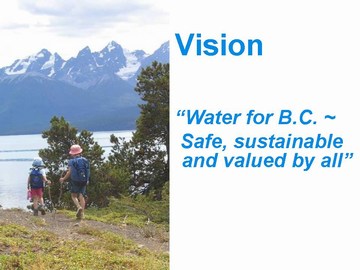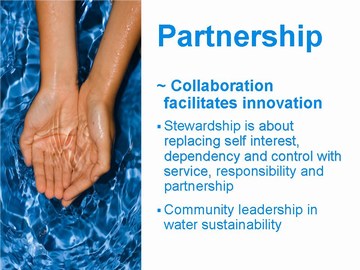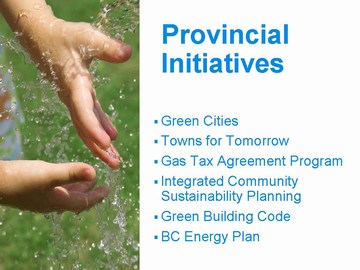FLASHBACK TO 2008: “Shared stewardship means shared responsibility and accountability for water at the most appropriate scale and capacity,” stated Zita Botelho, Ministry of Environment, when providing a provincial context at Showcasing Green Infrastructure Innovation in the Cowichan Basin
Note to Reader:
Convening for Action on Vancouver Island (CAVI), a regional pilot program, was implemented under the umbrella of the Water Sustainability Action Plan for British Columbia. The genesis for CAVI was ‘Meeting of the Minds’, a grass-roots initiative that started out as a communications network for water and wastewater practitioners.
In 2007, the CAVI program partnered with three regional districts to implement Showcasing Green Infrastructure Innovation on Vancouver Island; The 2007 Series.
Partnerships & Collaboration – Moving from Concept to Reality
The program for Showcasing Green Infrastructure Innovation in the Cowichan Basin in September 2007 included a context presentation by Zita Botelho, Manager of  Water Strategic Initiatives and a member of the Innovation and Planning Team in the Water Stewardship Division of the Ministry of Environment.
Water Strategic Initiatives and a member of the Innovation and Planning Team in the Water Stewardship Division of the Ministry of Environment.
The theme for the Cowichan event was Partnerships & Collaboration – Moving from Concept to Reality. In setting a provincial context, Zita built on this theme.
“CAVI exemplifies the partnerships and innovation that are required in BC to meet all the water challenges that we face province-wide,” stated Zita Botelho.
“The Ministry of Environment funds the work of the BCWWA Sustainability Committee, one of the CAVI founding partners, because the committee provides a forum for the Ministry of Environment to engage with a variety of partners. This leads to leveraging of efforts through programs such as the Showcasing Innovation Series.”
In explaining the significance of her presentation title, Zita Botelho noted that going against the current to be innovative is much harder than going with the flow downstream.

Safe, Sustainable and Valued by All
The provincial vision for water is “safe, sustainable and valued by all”. Zita Botelho elaborated on what this means by explaining that:
- It is about safe, cleaning drinking water and protection from floods and drought.
- It is about sustainable and responsible use, inclusive and transparent water governance, and healthy watersheds and aquatic ecosystems.
- It is about an ethic of water stewardship that is held by all British Columbians, who value water for the full range of benefits it provides.
“We can only attain this vision through shared stewardship, as government alone can not provide all the solutions,” summarized Zita.

What Innovation Means in Practice
In elaborating on the slide above, Zita Botelho observed that “These challenges are the drivers that are bringing us together to rethink “old ways”, seize opportunities and find innovative solutions toward creating better and more sustainable communities.”
According to Zita, “Water governance comes up again and again. What is the infrastructure for making decisions? There is an infrastructure of how decisions are made, who is involved and who is accountable. The legislation governing water management in BC is outdated.”
“The Ministry of Environment is working with the University of British Columbia and Fraser Basin Council to develop and assess a range of governance models, including the one proposed under the Cowichan Basin Management Plan for a Water Advisory Council that would have decision-making authority in this region,” explained Zita.
She also noted that we are seeing the increasing importance of social sciences in solving our “people” challenges – for example, solutions such as community based social marketing.
She quoted from Doug Mackenzie Mohr, author of the book Fostering Sustainable Behavior, who offers detailed steps to uncover the barriers that inhibit individuals from engaging in sustainable behaviors. He offers tools for practitioners to move people from good intentions to action. He places an emphasis that this work be done at the community level and involve direct contact with people.
She added that this ties in to communication, and the importance of a common sense approach:
- Use a human voice.
- Tell a story that people understand in plain everyday language.
- Tell a story that is hopeful and offers everyday solutions and benefits.
“The discussions will be different depending on which professionals are in the room,” observed Zita, “We believe we are getting better at the interdisciplinary approach. The Ministry is looking at how we can communicate better, how we are doing outreach, and how we can better support our staff who are on the ground.”

Partnerships Lead to Innovation
In explaining the thinking behind this slide, Zita Botelho stated that shared stewardship means shared responsibility and accountability for water at the most appropriate scale and capacity. It takes different forms depending on the players involved and the nature and complexity of water issues and decisions.
“Some decisions, by necessity, must remain under provincial regulatory authority; others may be better taken at the local level,” observed Zita, “Ultimately, of course, the Province must remain accountable for the protection and management of water resources in the public interest.”
“Water stewardship involves everyone,” she emphasized, “Government alone cannot provide all the solutions. Reaching our vision of safe, sustainable, and valued by all requires partnerships – both maintaining the ones we value, like the Water Sustainability Committee, as well as forging new.”
According to Zita, the Province is developing an action plan for water that is based on the concept of a collective strategy for working on water issues.
Zita commented that we can all become water stewards, and added that: “Stewardship is about replacing self interest, dependency and control with service, responsibility, and partnership.”
“Stewardship begins with the willingness to be accountable for some large body than ourselves – an organization or a community,” she continued, “And it requires a level of trust that we are not used to holding. It is acting on our own account, and if we all act on our own account – there is more accountability and ownership.
“And I think you would agree we are seeing just that in communities across BC where governments, industry, businesses, organizations and citizens are showing leadership and acting on a number of fronts ~ watershed planning round tables, water conservation and efficiency programs, water aware development practices, smart growth initiatives, etc.,” added Zita.
“Nicola, Cowichan, Langely Township, Okanagan, Columbia, Peace, Nechako…across the province – Waterbucket.ca showcases many examples, together with tools and practices to foster community water stewardship,” concluded Zita, “It is increasingly apparent that some of the best solutions for achieving sustainable, balanced water uses in a watershed come from the people who live there, with their local expertise and traditional ecological knowledge.”

Scope of Provincial Initiatives
According to Zita Botelho, there are a variety of provincial initiatives to provide direction and support for sustainable communities. The Ministry of Environment is supporting the Ministry of Community Services in advancing these initiatives:
- The Green City Awardswill recognize and profile leading-edge communities and provide them with further funding to invest in initiatives to make their communities and environments healthier. A total of $2.5 million will be provided over five years. Awards will be announced at the Union of BC Municipalities (UBCM) annual conferences.In her presentation, Zita did list the names of the local governments who had been named award winners two days earlier at the UBCM Conference. The winners included the Regional District of Nananimo, a CAVI partner.
- The Green Cities Project includes a number of ways to encourage physical activity, energy conservation, and environmental benefits for communities. A LocalMotion Fund of $40 million over four years will help build bike paths, walkways, greenways, improved accessibility for persons with disabilities, and support programs to get kids playing in communities and parks. New financial incentives will help municipalities shift to hybrid vehicle fleets and retrofit vehicles with cleaner technologies.
- The Towns for Tomorrow Programis targeted to smaller communities whose infrastructure projects are often ineligible for larger federal-provincial programs. The program will provide $21 million over three years to support small towns’ infrastructure priorities on cost-sharing basis.
- Integrated Community Sustainability Planning (ICSP) is a provincial initiative which originated from the 2005 federal/provincial/UBCM Federal Gas Tax Agreement (GTA). ICSP is a planning process that emphasizes long term thinking, broadening scope of plans to consider 4 pillars of sust, integration of plans at various levels, working in collaboration, with public engagement and education, monitoring & evaluation. Significant resources (beyond the funding opportunities of the GTA) will be available to help local governments engage in ICSP. – Smart Development Partnership Program
- A new BC Green Building Codewill be developed to remove barriers to sustainability in current provincial codes and regulations, and to propose new provisions for green buildings regulation with the greatest potential impact on sustainability and conservation.
- The BC Energy Plan sets ambitious targets for the Province and partners around energy conservation, efficiency, security and innovation. Some of these include:• targets for zero net greenhouse gas emissions• by 2010, new energy efficiency standards will be determined and implemented for buildings• by 2016, the province will be electricity self-sufficient
Zita Botelho closed her presentation by describing how the Ministry of Environment sees its role as a member of the CAVI Partnership.
To Learn More:
Download Water Leadership – making it upstream through Innovation and Partnership to view a PDF of Zita Botelho’s complete PowerPoint presentation.



